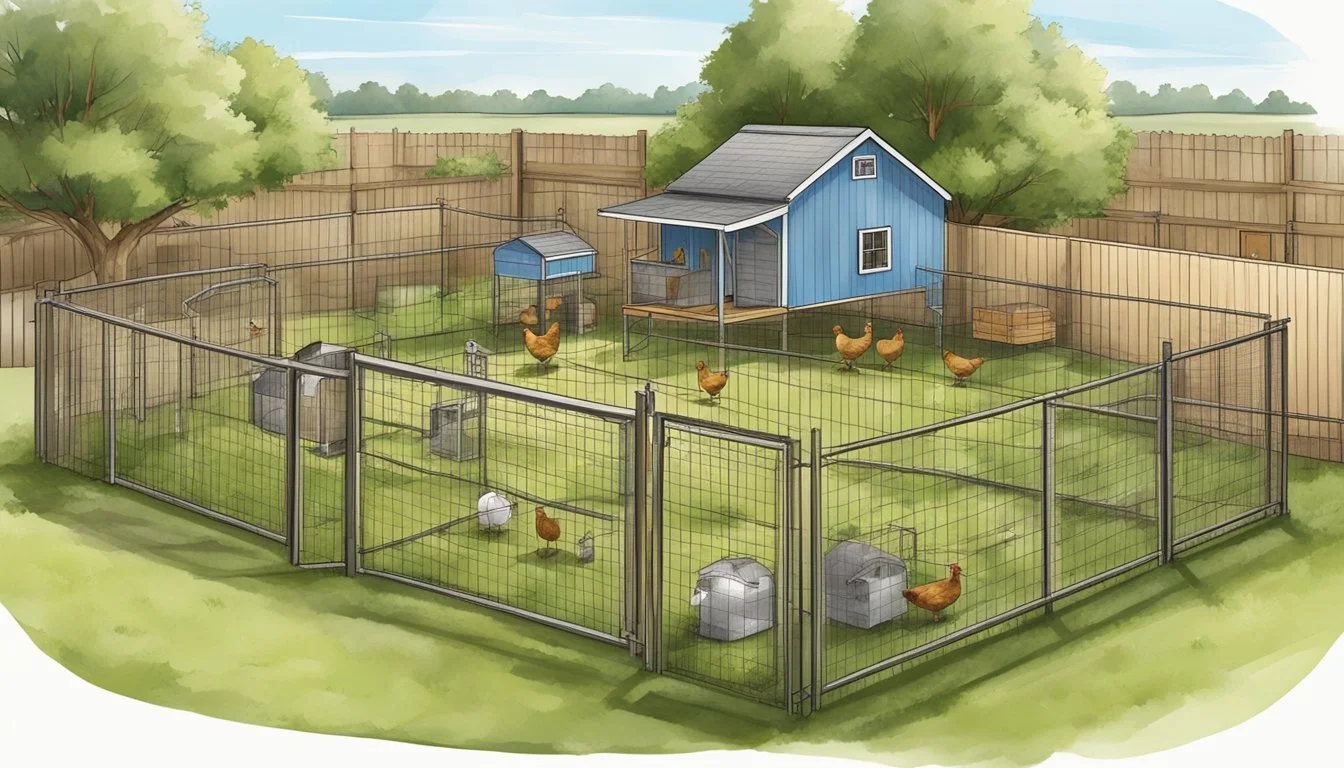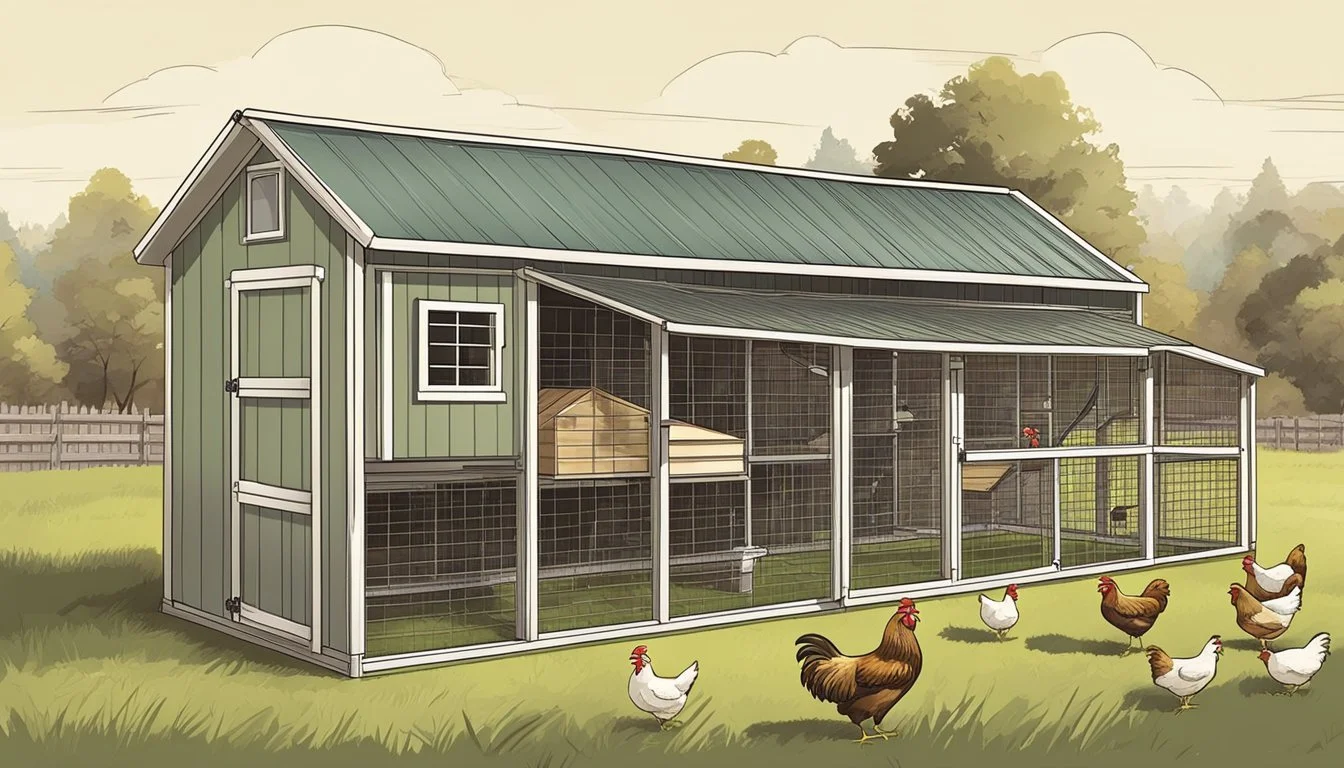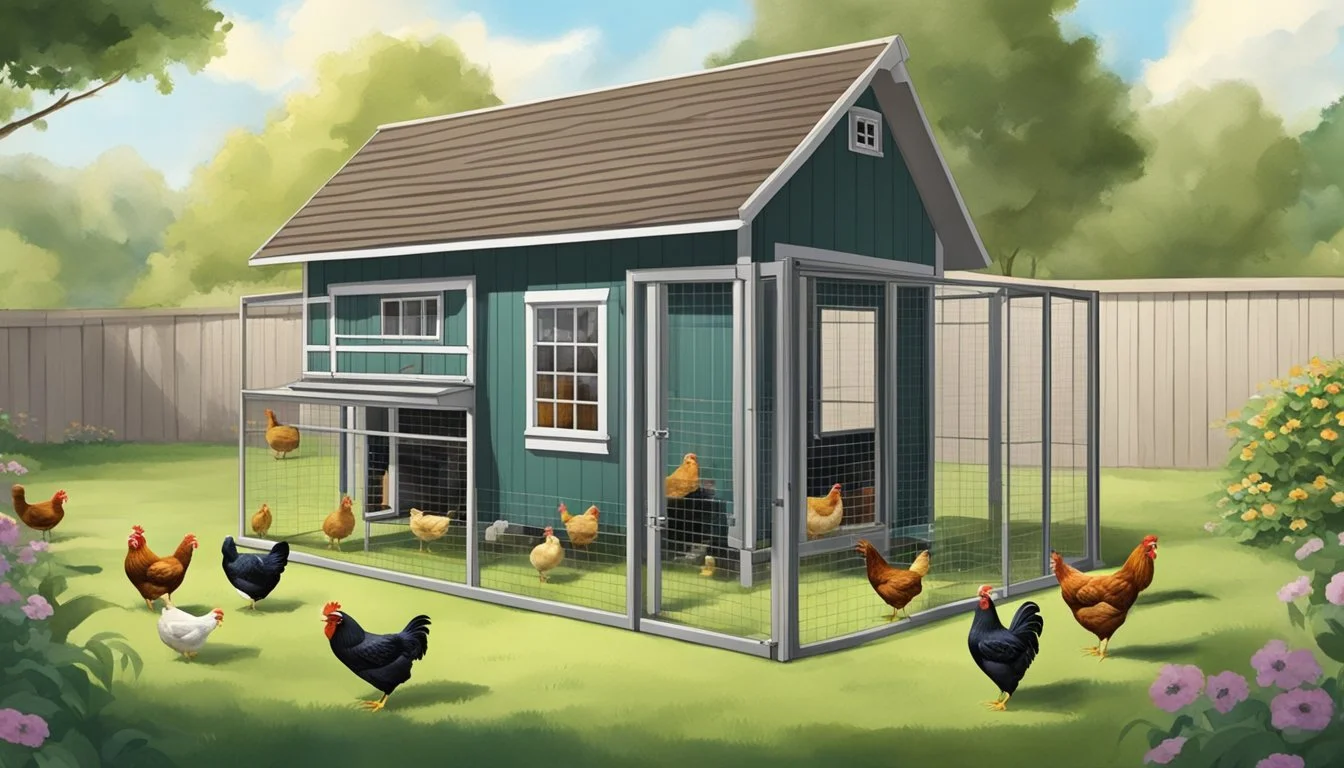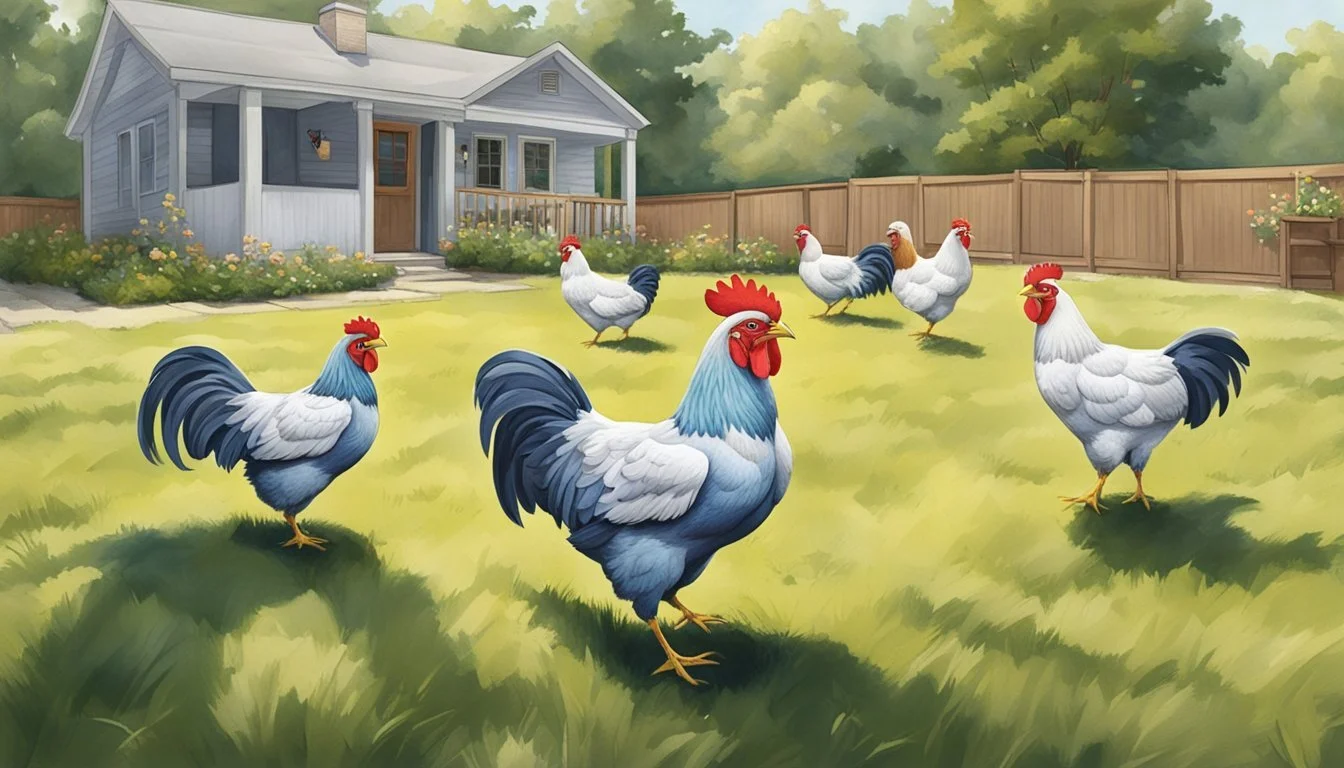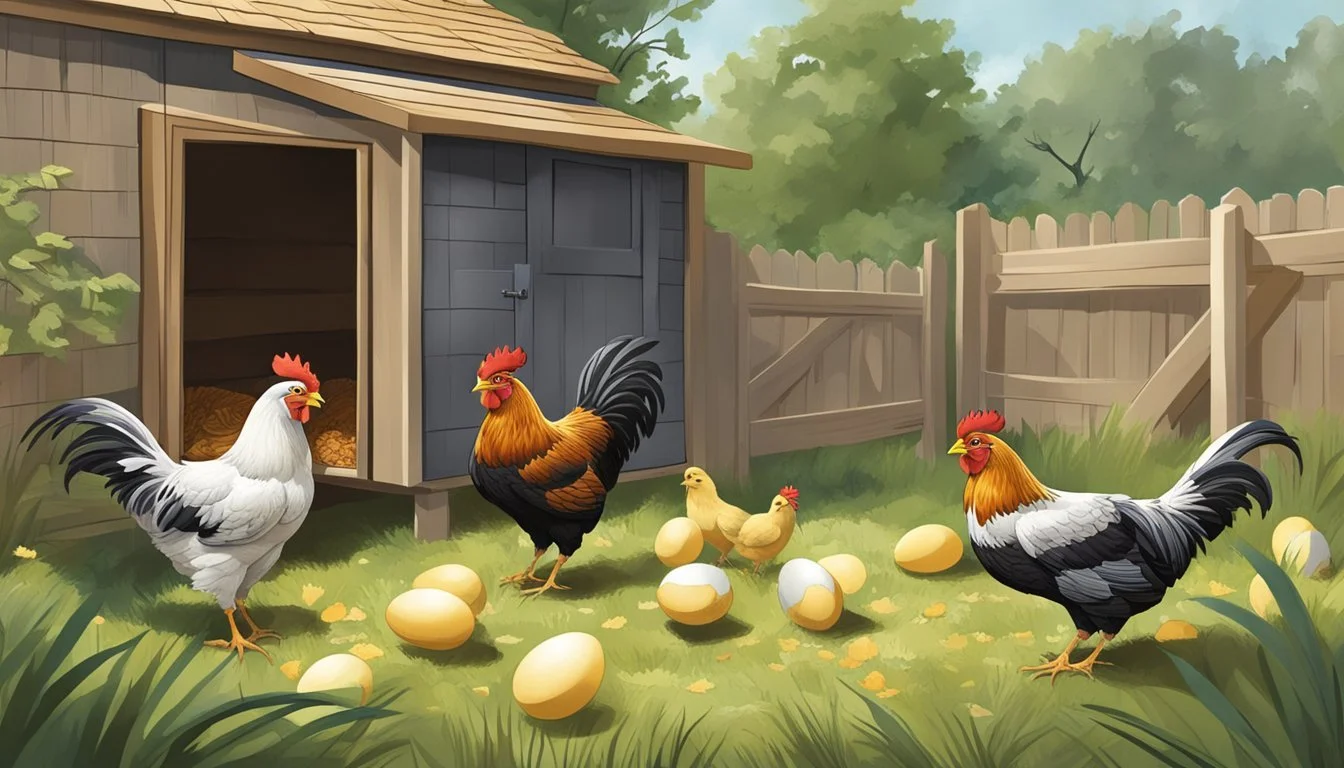Keeping Backyard Chickens in Wichita, KS
Essential Guidelines for Success
In Wichita, Kansas, the trend of raising backyard chickens is a subject of both interest and regulation. For those considering the pursuit of fresh eggs and the enjoyment of keeping poultry, the City of Wichita provides clear guidelines to ensure the practice aligns with urban living standards. Residents are allowed to keep a small flock of chickens without acquiring a permit, fostering a connection to local food sources and offering a glimpse into sustainable living.
However, to maintain harmony within city limits, regulations are in place to balance the interests of chicken enthusiasts with those of the broader community. The number of chickens permitted is limited, and specific rules are designed to address potential nuisances such as noise and odor. Permits are required for those wishing to keep more than three chickens, and there is an upper limit on the number of fowl one can maintain, reflecting the city's commitment to responsible animal husbandry within a metropolitan setting.
Legal Considerations for Raising Chickens in Wichita
Raising chickens in Wichita comes with a set of legal requisites to ensure compliance with city ordinances. Residents interested in keeping chickens must pay close attention to the number of chickens, permit stipulations, and possible fines.
Understanding the Wichita Chicken Ordinance
The City of Wichita stipulates that up to three chickens or fowl can be kept without a permit. Individuals looking to keep chickens should note that, according to Ordinance No. 46-247, Section 6.12.030, more than three chickens require a permit, with a cap at no more than twelve fowl. Certain birds, like roosters, are disallowed due to noise concerns.
Permit Regulations and Requirements
To obtain a permit, the Metropolitan Area Building and Construction Department must be contacted. Coops must maintain a minimum distance of 20 feet from any neighboring residence and should be constructed to be screened from public view.
Permit Details for Over Three Chickens:
Application to: City of Wichita Building and Construction Department
Maximum Number of Chickens Allowed: 12
Permit Fee: $25 yearly
Screening: Coops must not be visible
Chickens must be kept in a manner that prevents nuisances and adheres to public health standards.
Fines and Compliance
Failure to comply with the Wichita chicken ordinance may result in fines. The enforcement typically looks for conditions such as exceeding the allowed number of chickens without a permit or improper coop placements. It's vital for residents to maintain their coops and chicken counts accordance with city regulations to avoid these penalties.
Selecting the Right Chicken Coop
Selecting an appropriate chicken coop is essential for the welfare of your backyard chickens and compliance with local Wichita ordinances. It should accommodate your flock size while ensuring protection from predators and allowing for future upgrades.
Coop Requirements
The coop must be sturdy and spacious enough to meet the needs of your chickens. Each bird should have at least 3 to 4 square feet of space inside the coop, but more is preferable for their well-being. Adequate ventilation is critical to prevent moisture build-up and maintain air quality, while insulation helps regulate the temperature during extreme weather.
Predator-Proofing Your Coop
Ensuring the coop is predator-proof is vital for the safety of your chickens. All openings, including doors, windows, and vents, should be covered with a strong wire mesh to deter raccoons, foxes, and other common predators. The coop should have a solid, lockable door, and consider a reinforced base or buried wire to prevent digging predators from gaining entry.
Coop Upgrade Considerations
When selecting your coop, think about the potential need for future upgrades. Will you expand your flock? If so, choose a design that can be easily modified or added to. Also consider the ease of cleaning—removable trays and large access doors can streamline maintenance. Lastly, ensure there is room to add amenities like nesting boxes, roosting bars, and other comforts that can enhance your chickens' quality of life.
Chicken Care and Management
Successful backyard chicken keeping in Wichita, KS hinges on thorough understanding and execution of key care practices. Proper feeding, consistent health checks, and diligent coop maintenance are essential.
Feeding and Nutrition
Chickens require a balanced diet of proteins, carbohydrates, vitamins, and minerals. A common structure for their diet includes:
Starter Feed: High-protein feed for chicks up to 6 weeks old.
Grower Feed: Moderately high protein content for chickens from 6 to 20 weeks.
Layer Feed: Calcium-fortified feed for egg-laying hens.
Always provide clean water to prevent dehydration and disease transmission.
Health and Disease Prevention
Vaccination and biosecurity are central in preventing diseases in backyard flocks. Key points include:
Vaccinate chicks against common diseases like Marek's disease and Newcastle disease.
Implement biosecurity measures such as:
Regular cleaning and disinfecting of equipment.
Limiting visitor access to the coop.
Quarantining new birds before introducing them to the flock.
Regular observation for signs of disease like lethargy, respiratory distress, or uncharacteristic behavior is critical.
Cleanliness and Maintenance
Maintaining a clean environment is necessary for the overall health of the chickens.
Daily: Remove waste and provide fresh water.
Weekly: Clean feeders and inspect for parasites.
Monthly: Conduct thorough coop cleanings, replace bedding, and check for structural integrity.
Proper waste management and preventing moisture buildup will help reduce disease risk and ensure a healthy flock.
Chicken Flock Composition
Creating a well-balanced backyard chicken flock in Wichita, KS, requires understanding the specific behaviors of chickens and the dynamics between roosters and hens. The city ordinances allow a certain number of fowl per household, guiding residents on proper flock composition.
Understanding Chicken Behavior
Chickens are social creatures with a well-defined pecking order. Integrating new chickens into an existing flock needs to be managed carefully to minimize stress and conflict. Hens tend to be less aggressive than roosters and will establish their own hierarchy.
Observations: Chickens establish a social order that affects their foraging and roosting behavior.
Integration: Introduce new chickens gradually to avoid disruption of the established social order.
Rooster and Hen Dynamics
In Wichita, residents are allowed up to three chickens without a permit and as they are aware, no roosters are permitted within city limits.
Hens: Residents can keep up to 3 hens without a permit, fostering a quieter and less aggressive environment.
Roosters: Roosters are prohibited due to noise concerns and their propensity for aggression.
By complying with local ordinances and understanding chicken behavior, Wichita residents can manage a harmonious and legally compliant chicken flock.
Breeding and Egg Laying
In Wichita, Kansas, backyard chicken enthusiasts focus on breeds that thrive in local conditions and are prolific layers. Understanding egg production mechanisms and managing broody hens are crucial for a successful backyard flock.
Egg Production Basics
When selecting chicken breeds for their backyard flock, Wichitans should consider New Hampshire and Rhode Island Reds for their durability and good egg production. Chickens require adequate nutrition and care, including up-to-date vaccinations, to optimize their laying potential. They generally begin laying eggs at about 5 to 6 months of age, and peak egg production typically occurs in the first year, gradually decreasing afterward.
Key Elements for Egg Production:
Breed selection: Choose hardy breeds that adapt well to regional climate.
Nutrition: Provide a high-quality poultry diet to support health and egg laying.
Healthcare: Regular vaccines and check-ups are essential.
Environment: Chickens need a safe and comfortable coop.
Managing Broody Hens and Chicks
Broody hens decide to sit on eggs to hatch them into chicks. In managing broody hens, it is important to provide a separate nesting area where they can do this without disturbance. During this time, it's essential to ensure they leave the nest at least once a day to eat, drink, and exercise. Once chicks hatch, they require a brooder—a warm, secure place separate from older chickens to protect them from pecking and adverse weather.
Guidelines for Broody Hens and Chicks:
Nesting Area: Provide an undisturbed space for broody hens.
Daily Care: Ensure broody hens have access to food and water.
Brooder Setup: Maintain a warm and secure space for newborn chicks.
Local Resources and Community
For residents of Wichita, Kansas, a plethora of resources is available to support the keeping of backyard chickens. These range from finding necessary chicken-raising supplies to connecting with a community of seasoned and aspiring chicken enthusiasts.
Finding Supplies in Wichita
In Wichita, chicken owners can easily locate stores that offer a comprehensive range of supplies necessary for raising healthy fowl. Full-grown hens and baby chicks can be found at local farm stores, with prices typically ranging for baby chicks and for fully grown laying hens. Wichita's agricultural stores and feed shops also stock a variety of feed options catered to different stages of a chicken's life cycle, from starter feeds for chicks to layer feeds for egg-laying hens.
Essential supplies, including coops, feeders, waterers, and bedding, can be readily purchased at:
Farm and Fleet Stores
Local Feed Mills
Agricultural Supply Shops
Connecting with Local Chicken Enthusiasts
For those looking to immerse themselves in the community, Wichita has a thriving network of backyard chicken keepers. Interested individuals can join the "Wichita Backyard Chickens" group on Facebook, which is a private community where members share tips, discuss egg production, and offer advice on chicken care. The group maintains privacy for its members while being easily searchable for interested Wichita locals.
Events such as local farm store meetups, chicken-keeping workshops, and coop tours are often organized within the community, providing excellent opportunities for networking and learning. Involvement in these local events encourages responsible chicken keeping through the exchange of best practices and personal experiences.
Protecting Your Chickens from Predators
In Wichita, KS, backyard chicken keepers must prioritize safeguarding their flocks from local wildlife. Predators commonly threatening chickens in this region include foxes, hawks, owls, coyotes, raccoons, and possums. Creating a predator-proof environment is essential for the safety of the birds.
Strategies for Defense:
Secure the Coop: Reinforce the chicken coop with heavy-duty wire mesh to prevent predators from gaining access.
Fortify the Run: Covering the run with robust netting or wire can prevent attacks from aerial predators like hawks and owls.
Preventative Measures:
Lock up at Dusk: Ensure chickens are locked securely in the coop from dusk till dawn, as predators are more active at night.
Eliminate Attractions: Keep the coop area free of food scraps and debris to avoid luring predators.
Guardian Animals:
Dogs: A well-trained dog can serve as an effective deterrent to chickens' predators.
Continuous Vigilance:
Regular inspection and maintenance of fences, coop latches, and barriers are crucial. Chicken keepers should remain vigilant, as predators are often persistent and can exploit any weakness in defenses.
By implementing these measures, one can significantly reduce the risk of predation and ensure a safe habitat for their backyard chickens in Wichita, KS.
Space Planning for Your Flock
When planning space for a backyard chicken flock in Wichita, KS, adequate space is essential for the health and productivity of the chickens. Chickens require room to roam, forage, and engage in natural behaviors.
Indoor Space
A coop is the indoor space where chickens spend their nights and take refuge from inclement weather. The fundamental guideline for indoor space is as follows:
Minimum Space: Coop interiors should provide a minimum of 3 square feet per chicken.
Outdoor Space
Outdoor space pertains to the chicken run, an enclosed area allowing safe outdoor access. Recommendations are:
Minimum Run Space: At least 10 square feet per chicken in the run.
Considerations
Climate: Wichita's climate can influence the amount of indoor space chickens need during colder months.
Activity Level: More active breeds may benefit from additional space.
Additional Tips
Ensure the coop and run are predator-proof.
Regular cleaning helps prevent diseases.
Availability of necessities such as feeders, waterers, and nesting boxes while maintaining space comfort.
Chicken Keepers should continually monitor their flock's behavior and condition, adjusting space as necessary. Adequate space for each chicken greatly enhances overall wellbeing and productivity.
Benefits and Challenges of Urban Chicken Farming
Urban chicken farming in Wichita, KS, presents both opportunities and constraints for residents.
Benefits:
Local Food Source: Residents gain access to fresh, locally-sourced eggs, increasing food security and self-sufficiency.
Educational Value: Families experience hands-on lessons in responsibility, the cycle of life, and animal husbandry.
Sustainability: Keeping chickens can contribute to sustainable living practices by reducing food miles and providing natural fertilizer through chicken waste.
Challenges:
Space Constraints: Successful urban chicken farming requires careful planning to manage space efficiently.
Legal Restrictions: The City of Wichita allows up to three fowls without a permit, and no more than 12 with a permit, excluding pigeons. Roosters are typically prohibited to prevent noise disturbances.
Predators & Pests: Protecting chickens from urban predators and control of vermin attracted to coops are pressing concerns.
Neighbor Considerations: It's essential to maintain cleanliness and noise control to ensure good relationships with neighbors.
Ultimately, urban residents in Wichita can enjoy the rewards of raising chickens if they navigate the challenges with due consideration for local ordinances and practical limitations.


